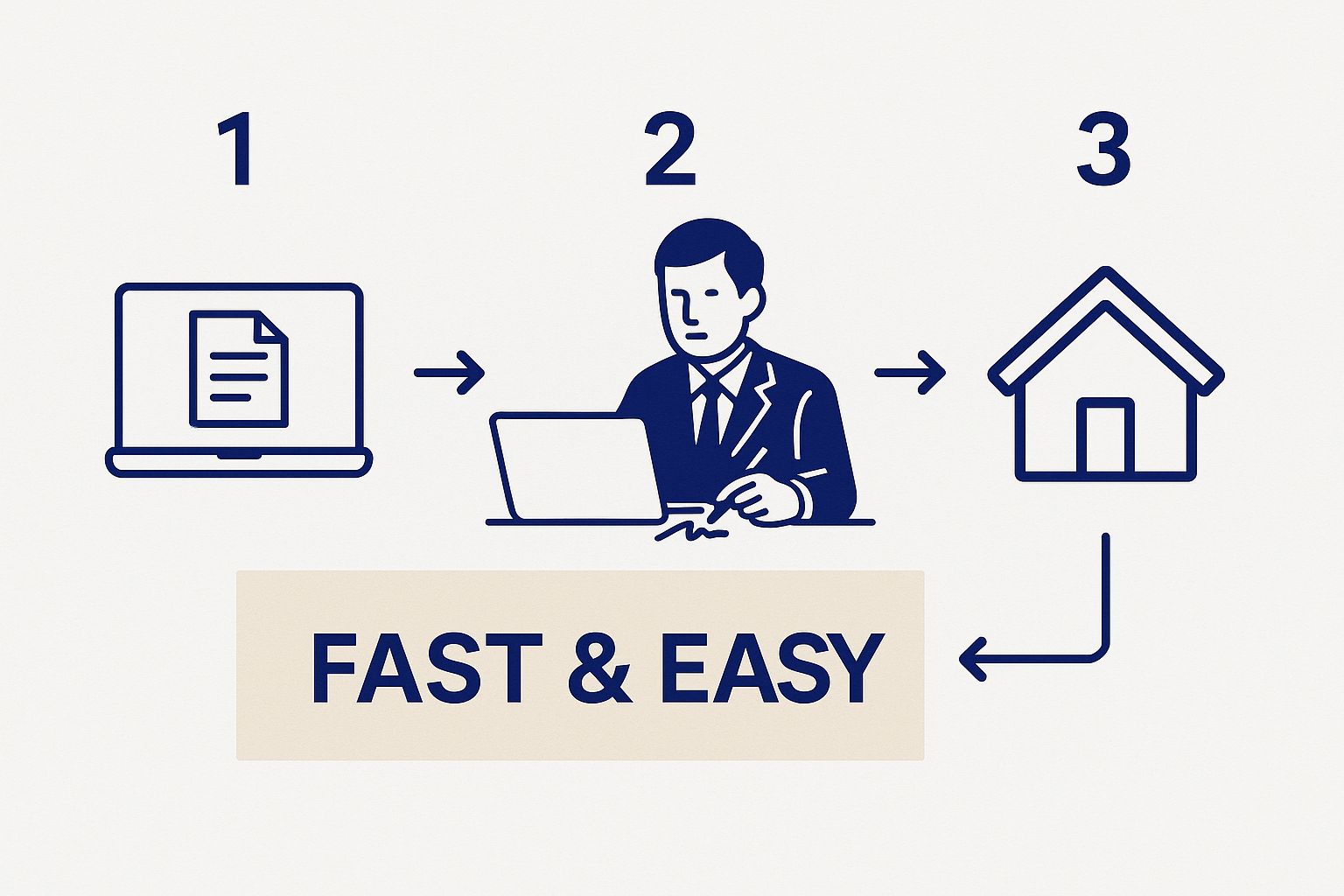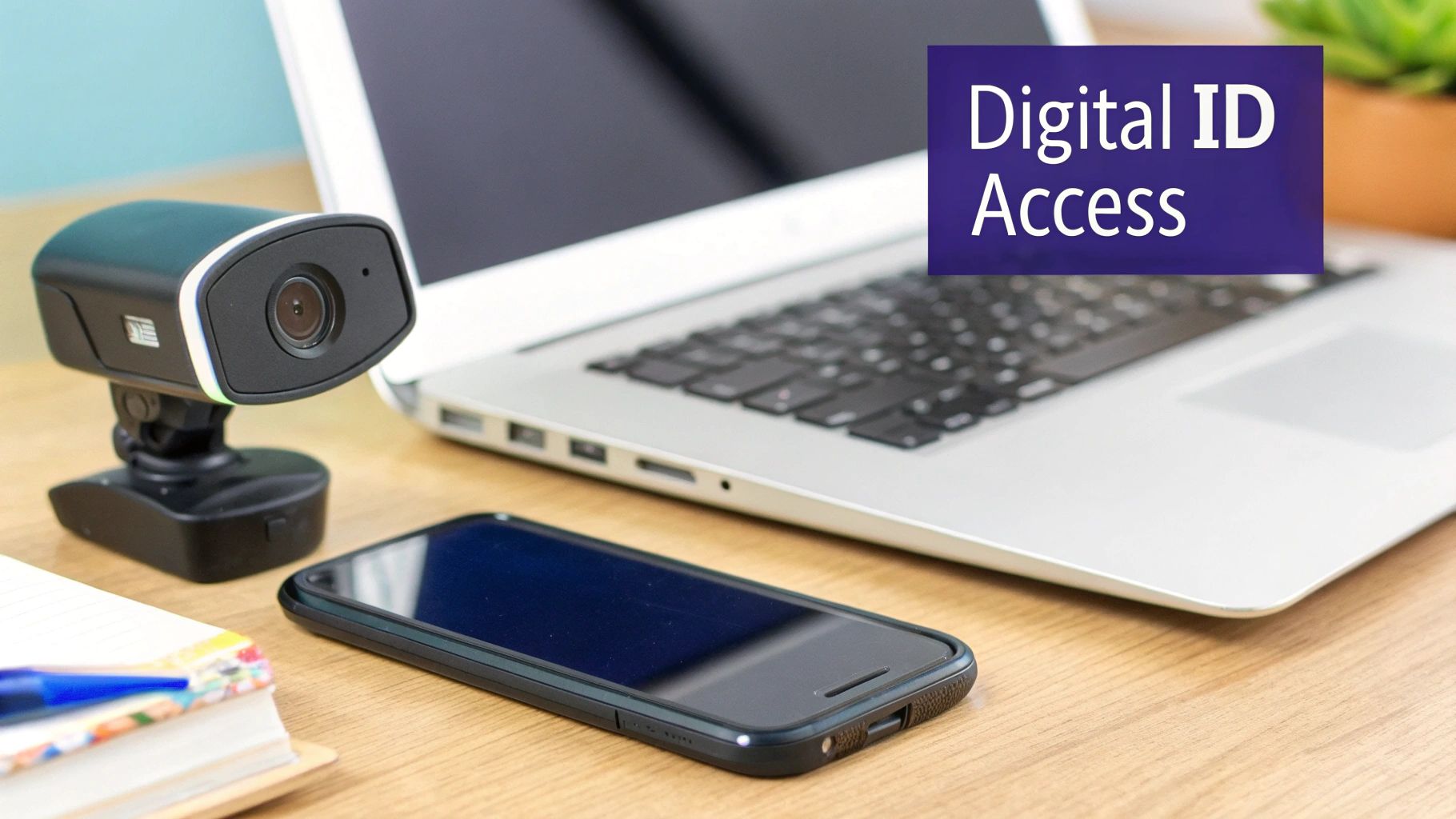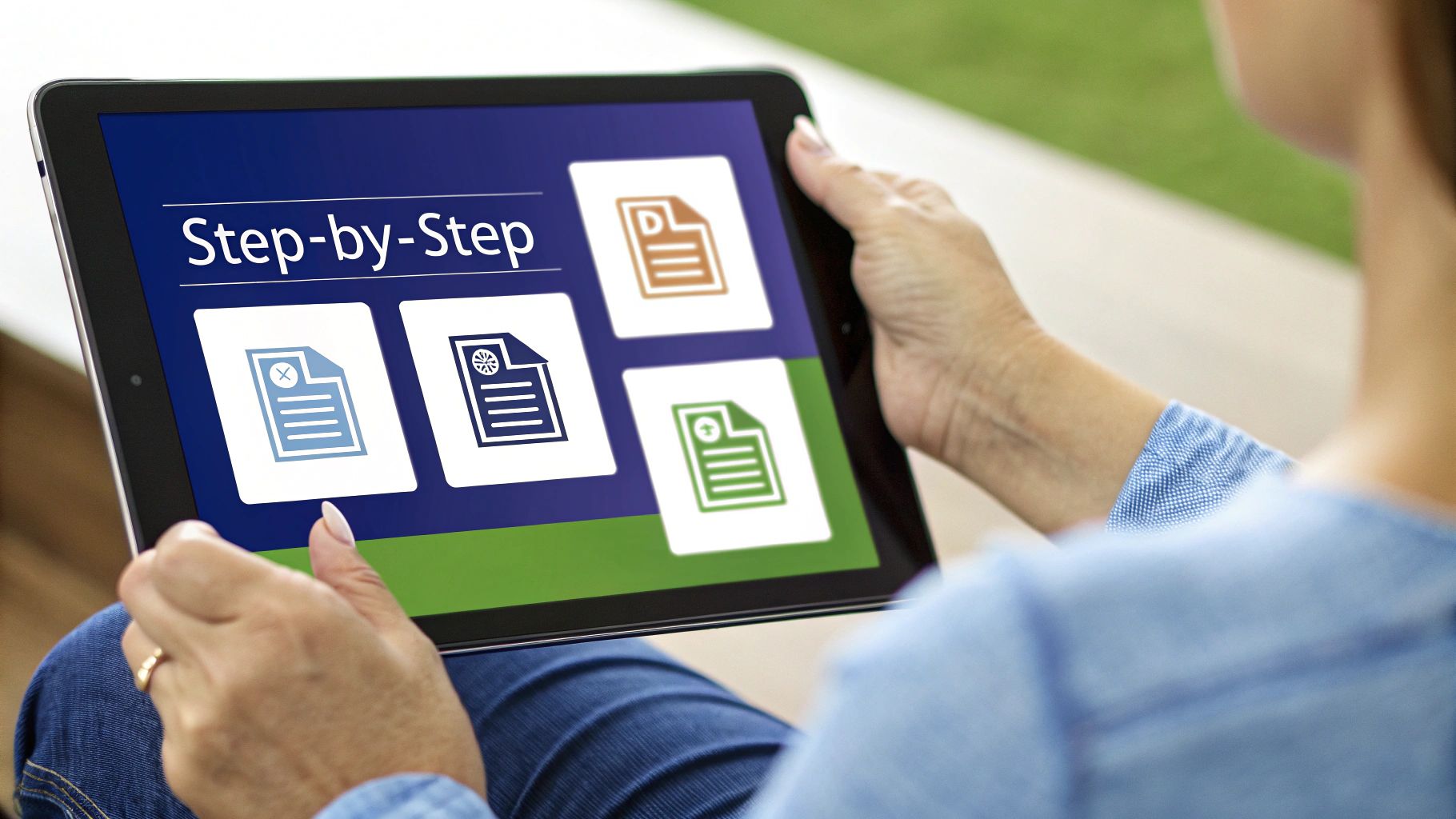Online Notary Public: Your Complete Guide to Digital Success
- WebsiteFix Technical Partner
- Jun 18, 2025
- 15 min read
Understanding Online Notary Public Without the Confusion
Let’s break down what online notary public services mean for everyday people and businesses. Imagine needing a document notarized, but instead of scheduling time off, driving to an office, and waiting in line, you could connect with a state-licensed official right from your computer. This digital approach turns a common chore into a simple, on-demand task. It’s a system designed not just for convenience, but for greater security and accessibility, reshaping how we manage important documents.
What Does an Online Notary Actually Do?
An online notary performs the exact same duties as a traditional one: they verify your identity and witness you sign your documents. The main difference is the environment. Instead of meeting in person, the entire event takes place over a secure, live audio-video conference. This process is officially called Remote Online Notarization (RON).
During a RON session, the notary uses sophisticated technology to confirm you are who you say you are. This often involves checking your photo ID against government databases and asking security questions that only you would know. The result is a legally recognized notarization, complete with a digital seal and a secure electronic record of the entire meeting, carrying the same legal weight as a classic ink stamp.
Real Scenarios, Real Solutions
The practical uses for an online notary public are broad, solving frequent logistical problems for both individuals and companies. These services become especially helpful when time and distance are significant barriers.
Here are a few situations where digital notarization is a perfect fit:
Urgent Business Agreements: A business owner traveling internationally can finalize and sign a time-sensitive contract without having to fly home.
Cross-State Family Documents: Siblings who live in different parts of the country can sign a power of attorney or trust documents together in a single, verified session.
Real Estate Closings: A homebuyer can complete the large stack of closing paperwork, including the mortgage, from the comfort of their own home.
A traditional notary relies on a physical journal and an ink seal to create a record of the event.

The digital process accomplishes the same goal by creating a tamper-evident digital certificate and a full video recording of the signing. This offers a robust, verifiable audit trail that is often more secure than its paper counterpart.
The Legal Backbone of Digital Trust
The acceptance of online notarization isn't just a matter of popularity; it rests on a firm legal framework. This shift is supported by laws that give electronic signatures and remote notarizations their official power. The quick adoption of these services is a direct outcome of these legal changes.
For example, in the United States, over 40 states have passed laws to permit Remote Online Notarization (RON), allowing notaries to witness signings via video conference. This broad legal backing ensures a document notarized online in a state with a RON law is recognized as legally valid across the country. This creates a dependable system for digital transactions. You can explore the details of this legal revolution to learn more. Ultimately, this means you can use an online notary public with complete confidence.
How Digital Notarization Actually Works Behind the Scenes
What truly happens when you click to connect with an online notary public? It’s far more than a simple video call. Behind the easy-to-use screen is a carefully arranged process built on several layers of security and verification technology. Instead of a video chat, picture it as entering a secure digital room where your identity is confirmed and your documents are protected at every turn. This technological backbone is what gives remote notarization its legal weight and integrity.
The Technology That Powers Trust
At the core of any reliable online notarization platform is a strong system designed to build and maintain trust. It all starts with identity verification, a process that goes much deeper than a quick look at a driver's license. This process usually involves a few key technologies working together.
First, your ID undergoes a sophisticated credential analysis. You'll be prompted to take a photo of your government-issued ID, which the system scans to confirm its security features are genuine. Next, you'll encounter Knowledge-Based Authentication (KBA), a series of questions pulled from public and private data records—questions that only you should be able to answer correctly. The entire session is conducted over a secure, encrypted audio-video link, ensuring your meeting is completely private. This multi-step approach confirms that the person signing is exactly who they say they are. The process concludes when the notary applies a tamper-evident digital seal, which cryptographically locks the document so that any future changes are immediately obvious.
A Step-by-Step Walkthrough of Your Session
While the technology behind the scenes is advanced, the experience for the user is designed to be direct and quick. For the signer, what used to be a time-consuming errand is now a task that can be completed in minutes. Platforms have refined this journey to be intuitive, even if it's your first time.
Here’s a breakdown of what you can expect:
Upload Your Document: Begin by uploading the document that needs to be notarized, typically as a PDF file, to the secure platform.
Verify Your Identity: You will then complete the identity verification checks, which include scanning your ID and answering the KBA questions.
Connect with a Notary: After your identity is confirmed, you are connected to a live video session with a commissioned online notary public. Some platforms can make this connection in under two seconds.
Sign Electronically: The notary will confirm your identity again face-to-face, watch you apply your electronic signature, and answer any questions you have about the notarial act.
Receive Your Document: Finally, the notary applies their unique digital seal and signature. The fully notarized, secure document is then ready for you to download, save, and share right away.
To really see the difference, it helps to compare the modern online process with the traditional in-person method. The table below shows just how much has changed.
Traditional vs. Online Notarization Process Comparison
Side-by-side comparison of steps, time requirements, and security measures between traditional in-person and online notarization
Process Step | Traditional Notarization | Online Notarization | Time Required |
|---|---|---|---|
Scheduling & Travel | Find a local notary, schedule an appointment, and travel to their location. | Connect with a notary on-demand from any device. No travel needed. | Hours or Days |
Identity Verification | Notary visually inspects your physical ID. | Multi-factor authentication including ID credential analysis and KBA questions. | 10-15 Minutes |
Signing the Document | Sign with a wet ink pen in the physical presence of the notary. | Apply a secure electronic signature while on a live, recorded video call. | 5-10 Minutes |
Notary's Seal | Notary applies a physical ink stamp and signs the document. | Notary applies a unique, tamper-evident digital seal and signature. | 1-2 Minutes |
Receiving the Document | You leave with the physical paper copy. | The secure digital document is available for immediate download. | Minutes |
As the comparison shows, the primary benefits of online notarization are the massive savings in time and the added layers of digital security that protect your document's integrity.
This visualization shows exactly how the process is centered on making a complex legal act fast and easy for the end-user.

What You Need for a Smooth Experience
Getting ready for your online notarization is simple, and you don’t need special software or technical skills. If you'd like to learn more, you can read about finding remote online notary services that are secure and convenient to better prepare.
To make sure your session goes perfectly, just have these items ready:
A desktop computer, laptop, tablet, or smartphone.
A stable internet connection.
A working webcam and microphone.
A valid, unexpired government-issued photo ID, such as a driver’s license or passport.
Your document ready in a digital format, like a PDF.
With these basics in place, you are all set to connect with an online notary public from virtually anywhere, whenever you need one.
Legal Framework That Actually Makes Sense
The legal rules for an online notary public might seem like a tangled mess, but they are actually built on a solid foundation of security and state-to-state cooperation. The legality of a remotely notarized document isn't a gray area; it's clearly defined by laws that ensure a document signed online has the same legal power as one stamped with traditional ink.
The Two Pillars of Online Notarization Law
The legal acceptance of remote notarization stands on two key principles. First, individual states must pass laws that specifically permit their notaries to perform these digital acts. States like Nevada, Virginia, and Texas were pioneers, setting the standards for identity checks and digital record-keeping that other states have since adopted.
The second, and perhaps most important, pillar is the concept of interstate recognition. Think of it like a driver's license. A license issued in your home state is recognized as valid in every other state you drive through. In the same way, a document that is legally notarized by an online notary public in a state with Remote Online Notarization (RON) laws is recognized as valid across all 50 states.
Security Mandates That Protect You
State laws don’t just allow online notarization; they require strong security protocols that often go beyond what’s required for a traditional, in-person signing. These are not mere suggestions—they are strict rules designed to protect the integrity of your documents and prevent fraud. These mandates almost always include:
Rigorous Identity Verification: The law requires more than a quick look at an ID card. Platforms use a multi-step process, often combining an automated analysis of a government-issued ID with knowledge-based authentication questions that only the signer would know.
Complete Session Recording: Every online notarization is recorded on video and audio. This recording is then securely stored, often for 5 to 10 years, creating a permanent and undeniable record of the event that can be reviewed if a dispute ever arises.
Tamper-Evident Sealing: After the notarization is complete, the document is locked with a digital seal. This cryptographic signature makes any change to the document after signing immediately obvious, guaranteeing its authenticity.
A Look at State-by-State Rules
While an online notarization is accepted everywhere, the laws deciding which notaries can perform them differ from state to state. The important thing to remember is that the law applies to where the notary is commissioned, not where the signer is located. This means a signer anywhere in the world can use a commissioned online notary public from an authorized state.
To help clarify how different states handle this, the table below provides a quick look at the legal status and requirements in a few key locations.
State-by-State Online Notarization Legal Status
A detailed look at RON legal status, requirements, and restrictions in key states
State | RON Status | Key Requirements | Effective Date |
|---|---|---|---|
Nevada | Fully Authorized | Secure identity proofing, audio-video recording, digital seal | 2018 |
Texas | Fully Authorized | KBA and credential analysis, electronic journal | 2018 |
Florida | Fully Authorized | Real-time audio-video, strict record retention | 2020 |
California | Recognizes Out-of-State RON | CA notaries cannot perform RON, but documents notarized online by out-of-state notaries are accepted | N/A |
The California example often causes confusion but actually demonstrates the strength of the system. Even though California notaries can't perform RON themselves, a Californian can confidently and legally use a Nevada-based online notary to finalize their documents.
Market Growth That Tells the Real Story
Now that the legal groundwork is firmly established, using an online notary public has gone from a niche convenience to a standard business practice. This isn't just a temporary trend born out of necessity; it's a real shift in how people and companies handle important paperwork. The numbers behind this growth tell a compelling story about trust, efficiency, and a lasting move toward digital document signing.
The Numbers Behind the Shift
The financial figures confirm what many are already experiencing. In 2024, the global market for e-notary software is valued at $242.22 million. That’s already impressive, but forecasts show it climbing to $797.53 million by 2037.
This jump represents a compound annual growth rate (CAGR) of over 9.6%, which points to steady, reliable expansion for years to come. This isn't a short-term bubble; it's sustained growth built on real-world value. You can dig deeper into the numbers by exploring the market research in more detail.
Why Major Industries Are Going Digital
This remarkable growth is happening because major industries are weaving remote notarization into their daily operations. They aren't just doing it for convenience; they're doing it to solve genuine business problems and operate more effectively.
Real Estate: Closing a deal no longer requires all parties to be in the same room. Buyers can sign loan documents from anywhere, breaking down the logistical barriers that once slowed down transactions.
Financial Services: Banks and investment firms can securely process contracts and account changes online, giving their clients a faster and more modern way to manage their finances.
Healthcare: Hospitals can manage patient consent forms and advance directives with greater ease, which is especially helpful for patients who have difficulty traveling.

In every one of these scenarios, an online notary public delivers a secure, legally-binding alternative that improves the customer experience and makes internal processes more efficient.
A Competitive Market Means Better Options for You
As the market for online notarization grows, more companies are entering the space, from established names to new startups. This healthy competition is great news for you. When platforms compete for your business, they are pushed to offer a better, more secure, and user-friendly service.
This means you can expect:
More Availability: Many platforms offer access to notaries 24/7, so you are no longer tied to a 9-to-5 schedule to get your documents signed.
Competitive Pricing: With more providers to choose from, the cost of using an online notary public has become more affordable than ever.
Improved Technology: Companies are constantly refining their platforms, leading to smoother, more intuitive, and more secure notarization processes.
This cycle of improvement is a key reason the service is becoming so popular and is a strong sign of its staying power. It's one of the many reasons why online notarization is the future of document verification.
Because of this market growth, getting a document notarized online is not just a possibility—it's quickly becoming the preferred choice for its accessibility, security, and overall reliability.
Real-World Success Stories That Prove the Value
Market growth charts are one thing, but the true story of any technology is told through the people it helps. The real worth of an online notary public comes to light when it solves problems that once seemed like major roadblocks. These scenarios show it's more than just a convenience—it's a better way to handle critical documents securely.
When Digital Notarization Shines Brightest
Think about an executive traveling in Europe who needs to close a million-dollar acquisition back in the United States. In the past, this would have meant a frantic, last-minute flight home. Today, they can connect with a notary online and finalize the deal in minutes from their hotel room, turning a potential crisis into a simple task.
Or consider an elderly couple needing to update their will during a health concern that limits their mobility. Without leaving their home, they can securely connect with a commissioned notary and sign their updated estate documents, ensuring their wishes are legally recorded with peace of mind. The service is just as powerful for complex agreements, allowing teams across different time zones to gather in one virtual room to sign documents, eliminating frustrating back-and-forth coordination.
This screenshot from a leading platform shows the kind of straightforward interface users see.
The clean design and clear instructions on platforms like DocuSign help demystify the process, making it feel as simple as joining a standard video call.
The Right Documents for the Job
While the technology is flexible, certain documents are a natural fit for the online notarization process. These are often time-sensitive, involve multiple parties in different locations, or require a high degree of security and a clear audit trail. Making an informed decision about when to use an online notary public starts with knowing which documents benefit most.
Here are some of the most common documents handled through remote online notarization:
Real Estate Documents: From initial offers to the final closing package, including mortgage agreements and quitclaim deeds. The ability to sign from anywhere speeds up transactions significantly.
Power of Attorney (POA): Granting someone the authority to act on your behalf, often needed urgently for financial or healthcare matters.
Affidavits and Sworn Statements: Legally binding statements that require the signer to swear an oath before a notary, easily accomplished over a recorded video session.
Business Contracts: Finalizing partnership agreements, vendor contracts, and other corporate documents without the need for in-person meetings.
Estate Planning Documents: Securing last wills and testaments or living trusts with a full audio-video recording of the signing ceremony for an added layer of validation.
Of course, a few situations might still call for a traditional approach. Certain international documents may have specific in-person requirements depending on the destination country’s laws. Additionally, individuals without access to a stable internet connection or the required technology may find an in-person notary more practical.
However, for a vast majority of domestic needs, online services provide a superior alternative. These insights help show how an online notary public isn’t just a substitute for the traditional method—it’s an upgrade. It provides a secure, legally sound, and remarkably efficient solution for life’s most important moments, giving you the power to move forward with confidence no matter where you are.
Global Expansion Creating Worldwide Opportunities

The concept of an online notary public is breaking free from geographic constraints. As technology makes the world smaller, legal standards for verifying documents are catching up. This international acceptance opens the door for businesses and individuals operating globally, turning what was once a major logistical problem into a manageable digital task.
Adapting Laws for a Connected World
Countries around the world are taking notice. They are looking at the success of remote notarization systems, such as those in U.S. states like Nevada, to help shape their own laws. This growing consistency means an international contract between a company in Texas and a supplier in Germany can be signed and notarized in one secure online meeting.
This legal alignment is critical. It gives companies the assurance they need to grow and gives people the ability to handle personal matters, like selling property or managing an estate, across borders without the high cost and travel time just for a signature. It is building a common standard for verified trust online.
Emerging Markets and Explosive Growth
This global acceptance is fueling a rapidly growing market. According to market research, the remote online notary service industry is projected to grow at a compound annual growth rate (CAGR) of 18.2% from 2025 to 2033. This growth is expected to push the market's value to nearly $1,836.6 million by 2033. The Asia-Pacific region, with its large population and improving digital access, is predicted to be a major part of this expansion. You can explore the complete research here.
The Next Wave of Notary Technology
Beyond new laws, technology is also evolving to make the work of an online notary public even more secure and dependable. A few key developments are poised to add new layers of trust to every transaction. These future developments include:
Blockchain Verification: Imagine a digital certificate for your document that can never be altered or lost. Once notarized and logged on a blockchain, the document's history is sealed, creating a tamper-proof record that proves its authenticity indefinitely.
Enhanced AI Security: Artificial intelligence is making identity checks incredibly robust. Future AI systems will be able to analyze tiny behavioral cues during a video call, adding a security layer that can spot a fraud attempt that a human eye might miss.
Integrated Workflow Solutions: Soon, getting a document notarized won't be a separate task. It will be a seamless step inside other business platforms. Think of a real estate platform where a sales contract is drafted, signed by all parties, notarized, and filed with the county clerk, all without leaving the application.
These upcoming tools are set to make online notarization a fundamental part of conducting secure business and personal affairs online.
Your Practical Roadmap to Digital Notarization Success
Knowing how online notarization works is one thing, but using it confidently is another. Let's walk through the exact steps and insider tips to ensure your first experience with an online notary public is smooth and successful.
Choosing the Right Platform for Your Needs
Think of online notary platforms like choosing a coffee shop. Sometimes you just need a quick espresso to go, and other times you need a place to host a meeting. The best choice depends entirely on your situation.
For a single document, a service that lets you pay per session with 24/7 availability is a perfect match. If you're a business with frequent notarization needs, look for platforms offering subscription models or tools for managing multiple users. A good rule of thumb is to choose a provider compliant with high-standard regulations, such as those set in Nevada, as it signals a commitment to security and reliability.
Preparing for a Flawless Session
Just like packing for a trip, a little preparation goes a long way. Spending five minutes getting organized can prevent any hiccups during the live session and make the process feel effortless.
The Document Itself: Have the final, unsigned version of your document saved and ready, preferably as a PDF.
Government-Issued ID: Grab your driver's license or passport. Make sure it's current—an expired ID won't be accepted.
A Quick Tech Check: Do a quick check to ensure your internet is stable and your device's camera and microphone are working.
A Private Setting: Find a quiet, well-lit spot where you can focus without interruptions. This is a live video call, after all.
Navigating Special Situations
What happens when you're not the only one signing? Or if another signer is halfway across the world? This is where online notarization truly shines.
Most modern online notary public platforms are built to handle these exact scenarios, allowing multiple people to join the same secure video session from their own locations. What used to be a major logistical puzzle becomes a simple, coordinated event. The key is to confirm the platform’s capabilities beforehand and communicate your needs so the notary can guide everyone smoothly.
By following this simple roadmap, you're ready to handle any digital notarization with ease. The system is built to be secure, straightforward, and accessible. To see a detailed walkthrough of this process, check out our guide on how to get documents notarized online.
Ready to experience this convenience firsthand? Signature on Demand provides professional 24/7 mobile and online notary public services based in Las Vegas, Nevada. Whether you need a document notarized or require expert document preparation, we make the process simple. Visit Signature on Demand at https://signatureondemand.net to get started.
Article created using [Outrank](https://outrank.so)




Comments